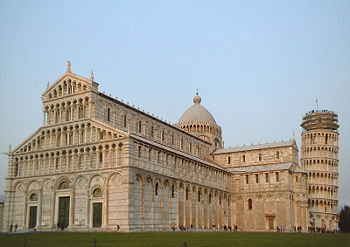- Roman Catholic Archdiocese of Pisa
-
Archdiocese of Pisa
Archidioecesis PisanaLocation Country Italy Statistics Area 847 km2 (327 sq mi) Population
- Total
- Catholics
310.333
305.270Information Rite Roman Cathedral Cathedral of Pisa Current leadership Bishop Giovanni Paolo Benotto The Archdiocese of Pisa (Latin: Archidioecesis Pisana) is a metropolitan see of the Catholic Church in Italy. It was founded in the 4th century and elevated to the dignity of an archdiocese on 21 April 1092, by Pope Urban II. Its mother church is the Cathedral in the Piazza del Duomo. Since 2008 the Archbishop of Pisa has been Giovanni Paolo Benotto.
From the late eleventh to the early thirteenth century, the Pisan archdiocese was the feudal suzerain of the four giudicati of Sardinia.
In 1092 Pope Urban II gives to the archbishop of Pisa the title of Primate of Corsica and Sardinia. The title is nowadays honorary for historical reasons.
List of Archbishops and Bishops of Pisa (incomplete)
- Gaudentius, present at the Council of Rome (313)
- St. Senior (410), who consecrated St. Patrick
- Joannes (493)
- one, name unknown, who took part in the schism of the Three Chapters (556)
- Alexander (648)
- Maurianus (680)
- one, name unknown, taken prisoner by Charlemagne at the siege of Pavia (774)
- Oppizo (1039), the founder of the Camaldolite convent of S. Michele
- Landulfus (1077), sent by Pope Gregory VII as legate to Corsica
- Gerardus or Gerard (died 1085)[1], a controversialist against the Greeks
- Vacant (1085-1088)[1]
- Dagobert (1088-1105)[1], the first archbishop and the second Latin Patriarch of Jerusalem
- Pietro Moriconi (1105-1119)
- Roger (1129)[2]
- Uberto Rossi Lanfranchi (1133–1137)
- Balduino da Pisa (1138–1145)
- Villano Gaetani (1146–1175), compelled to flee from the city on account of his fidelity to Alexander III (1167), returned in 1172
- Ubaldo Lanfranchi (1176–1208)
- Lotario Rosari (1208), also Patriarch of Jerusalem (1216)
- Federico Visconti (1254), who held provincial synods in 1258, 1260, and 1262
- Teodorico Ranieri
- Ruggieri degli Ubaldini
- John of Polo (Giovanni de Polo)
- Oddone della Sala (1312) had litigations with the republic, and later became Latin Patriarch of Alexandria
- Simone Saltorelli
- Giovanni Scarlatti (1348), who had been legate to Armenia and to the emperor at Constantinople
- Francesco Moricotti Prignani
- Lotto Gambacorta (1381), compelled to flee after the death of his brother Pietro, tyrant of Pisa (1392)
- Alamanno Adinari (1406), a cardinal who had an important part in the conciliabulum of Pisa and in the Council of Constance
- Filippo de' Medici
- Francesco Salviati Riario (1475), hanged at Florence in connexion with the conspiracy of the Pazzi; succeeded by his nephew
- Rafaele Riario (1497)
- Cesare Riario (1499)
- Onofrio de' Bartolini (1518)
- Pietro Jacopo of Bourbon
- Giovanni Ricci[3]
- Scipione Rebiba (1556)
- Giovanni de' Medici (1560), a son of Cosimo
- Angelo Niccolini (1564)[4]
- Carlo Antonio Dal Pozzo (1582), founder of the Collegio Puteano, and author of works on canon and on civil law
- Francesco Bonciani, Galileo's opponent
- Giulio de' Medici (1620), served on missions for the duke, founded the seminary
- Scipione Pannocchieschi (1636)
- Cosimo Corsi (19 December 1853 - 7 October 1870)
- Paolo Micallef ( 1871–1883 )
- Ferdinando Capponi (8 March 1883 - 21 March 1903)
- Pietro Maffi (22 June 1903 - 17 March 1931)
- Gabriele Vettori (6 February 1932 - 2 July 1947)
- Ugo Camozzo (13 January 1948 - 22 September 1970)
- Benvenuto Matteucci (2 January 1971 - 7 June 1986)
- Alessandro Plotti (7 June 1986 - 6 April 2008)
- Giovanni Paolo Benotto (6 April 2008 - )
Notes
- ^ a b c Patricia Skinner, From Pisa to the Patriarchate: Some Chapters in the Life of (Arch)bishop Daibert of Pisa, in Patrica Skinner ed., Challenging the Boundaries of Medieval History: The Legacy of Timothy Reuter, Brepols, 2009, p. 159
- ^ Skinner, op. cit., p. 161
- ^ The Cardinals of the Holy Roman Church - Biographical Dictionary - Consistory of November 20, 1551
- ^ The Cardinals of the Holy Roman Church - Biographical Dictionary - Consistory of March 12, 1565
External links
- "Pisa". Catholic Encyclopedia. New York: Robert Appleton Company. 1913. http://www.newadvent.org/cathen/12110a.htm.
- Catholic Hierarchy page
 This article incorporates text from a publication now in the public domain: Herbermann, Charles, ed (1913). "Pisa". Catholic Encyclopedia. Robert Appleton Company.Categories:
This article incorporates text from a publication now in the public domain: Herbermann, Charles, ed (1913). "Pisa". Catholic Encyclopedia. Robert Appleton Company.Categories:- Roman Catholic dioceses in Italy
- Roman Catholic archbishops of Pisa
Wikimedia Foundation. 2010.

